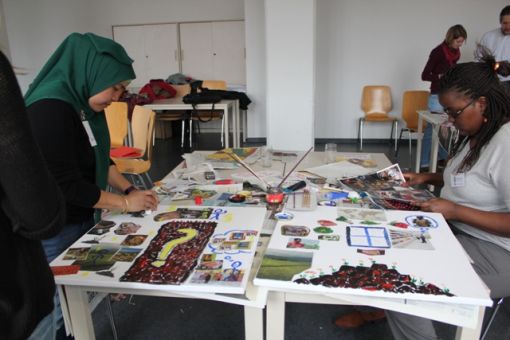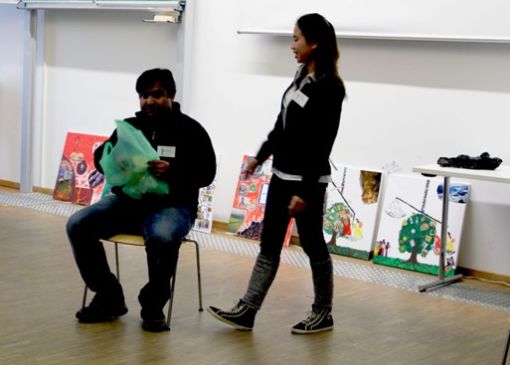Ragout Masala with eggplant, carrots and rice – sounds delicious, right? But where do the ingredients for this cafeteria meal come from? The students from the Environmental Governance (MEG) MSc programme at the University of Freiburg addressed this very question during this year’s Freiburg Forum on Environmental Governance titled “The Cost of Food – Beyond the Price Tag”.
The fate of “Peter the Plastic Eater” is not a pretty one – his consumer habits are his final demise. A discarded plastic shopping bag makes its way down the gutter, into the ocean and into the belly of a fish. The fish, which lands on Peter’s plate, puts Peter’s life in peril. This fatal tale was staged as part of a ten-minute play with a very clear message: our decisions about what we eat should not boil down to what looks like an appetizing meal at an attractive price. The play was the outcome of a workshop conducted during the Freiburg Forum on Environmental Governance held at the end of February. The event is organised every year by the MEG students.
Creative and artistic
This year’s central question revolved around the real cost of our food: What is the real price we pay for the production of food and our consumption habits? Some of the hidden costs include deforestation through agriculture, health problems from cheap, low-quality food and high carbon emissions from long transport distances. Answers were sought by the MSc programme’s 28 students from 22 countries and their 40 guests in four workshops where creativity played a central role.
As part of the Science Slam, for example, participants learned how take a highly complex issue such as the dying out of the honeybees and present it in a clear and concise manner. In the infographic workshop, the students discussed the many ways data can tell a story depending on how it is interpreted. The painting and theatre workshops gave the students and their guests the chance to tackle the issues through the visual and performing arts. “We were forced to take a very abstract idea and give it a very concrete form,” says MEG student János Jákli, who helped moderate the theatre workshop. “It really forced us to consider the issues very carefully.” The process was enriched by the participants’ expertise and regional perspectives.
No easy answers
At the end of the event, the students shared their insights with the public. A total of 350 guests attended the public event to discuss the individual’s role in creating a fair and affordable food system with a panel of four experts.
Fadzai Munyaradzi from Zimbabwe helped organise the event. Over the course of the Freiburg Forum she realised just how many aspects must be weighed when addressing the issue of food – from production techniques and government regulation to rules of the global marketplace. “There’s no such thing as a good guy or a bad guy here,” says Fadzai Munyaradzi. “The goal of our programme is to do things better or to make them right. But as it turns out, that’s easier said than done.”
The students were busy promoting the “Cost of Food” topic long before the start of the Forum. A special poster event in two of the university’s cafeterias featuring two of the cafeteria’s best-selling meals, showed where the ingredients come from and the production stages that are necessary to get them from their source to the students’ plates. The students also developed a smartphone app that tells users where to find delicious eco-friendly, fair-trade or regional food in Freiburg. The app also features a carbon footprint calculator and other useful tools.
More impressions from the workshop in our image gallery on facebook
„Amazonas zu versteigern“ – MEG-Studierende führen Theaterstück über nachhaltigen Konsum auf








